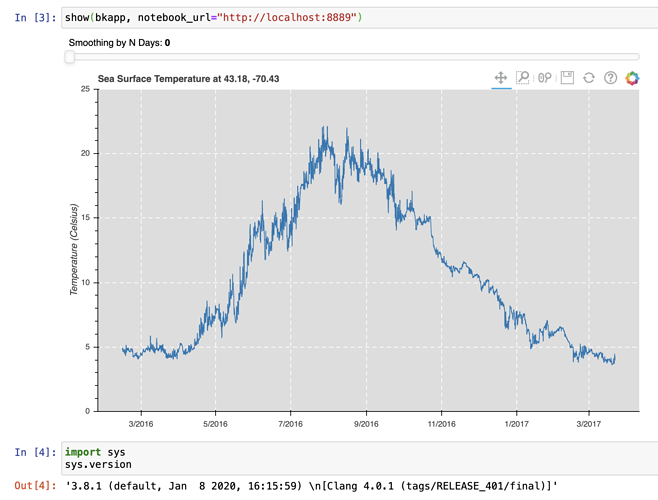Hello, I didn’t want to post this on the bugs page yet in case I am doing something incorrect.
The following code * works perfectly in a Jup notebook in a fresh python 3.7.3 venv, but the app does not display using identical code and python 3.8.3. Am I doing something wrong or should I open an issue?
This is just a regular venv with notebook and bokeh installed using pip (not conda or something else).
from bokeh.io import output_notebook, show
from bokeh.plotting import figure
from bokeh.models import ColumnDataSource, HoverTool
import pandas as pd
import numpy as np
from bokeh.layouts import grid
from bokeh.models import Button, TextInput
output_notebook()
sample1 = np.random.multivariate_normal([0,0], [[1,0],[0,1]], 100)
sample2 = np.random.multivariate_normal([1,1], [[0.05,0],[0,0.05]], 100)
sample = np.concatenate([sample1, sample2])
df = pd.DataFrame(sample, columns=('x','y'))
df['value'] = np.sqrt(df['x']**2 + df['y']**2)
df.head()
source = ColumnDataSource(df)
tools = "box_zoom, undo, crosshair"
def modify_doc(doc):
# same as before
source = ColumnDataSource(df)
p = figure(tools=tools)
p.scatter('x','y', source=source, alpha=0.5)
p.add_tools(
HoverTool(
tooltips=[('value','@value{2.2f}'),
('index', '@index')]
)
)
# this function is called when the button is clicked
def update():
# number of points to be added, taken from input text box
n = int(npoints.value)
# new sample of points to be added.
# we use the a narrow gaussian centred on (-1, 1),
# and draw the requested number of points
sample3 = np.random.multivariate_normal([-1,-1], [[0.05,0],[0,0.05]], n)
df_new = pd.DataFrame(sample3, columns=('x','y'))
df_new['value'] = np.sqrt(df['x']**2 + df['y']**2)
# only the new data is streamed to the bokeh server,
# which is an efficient way to proceed
source.stream(df_new)
# GUI:
button = Button(label='add points:')
npoints = TextInput(value="50")
button.on_click(update)
# arranging the GUI and the plot.
layout = grid([[button, npoints], p])
doc.add_root(layout)
show(modify_doc)
* Codes comes from this tutorial: Interactive Visualization with Bokeh
